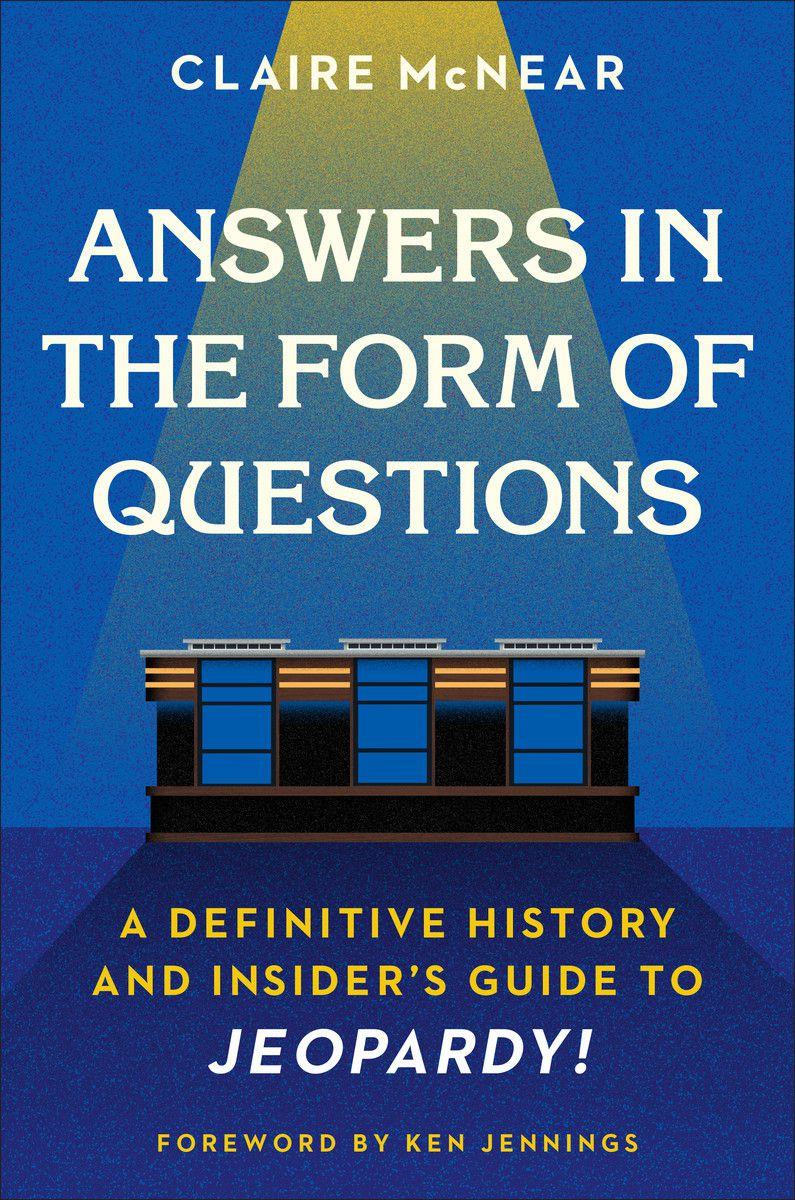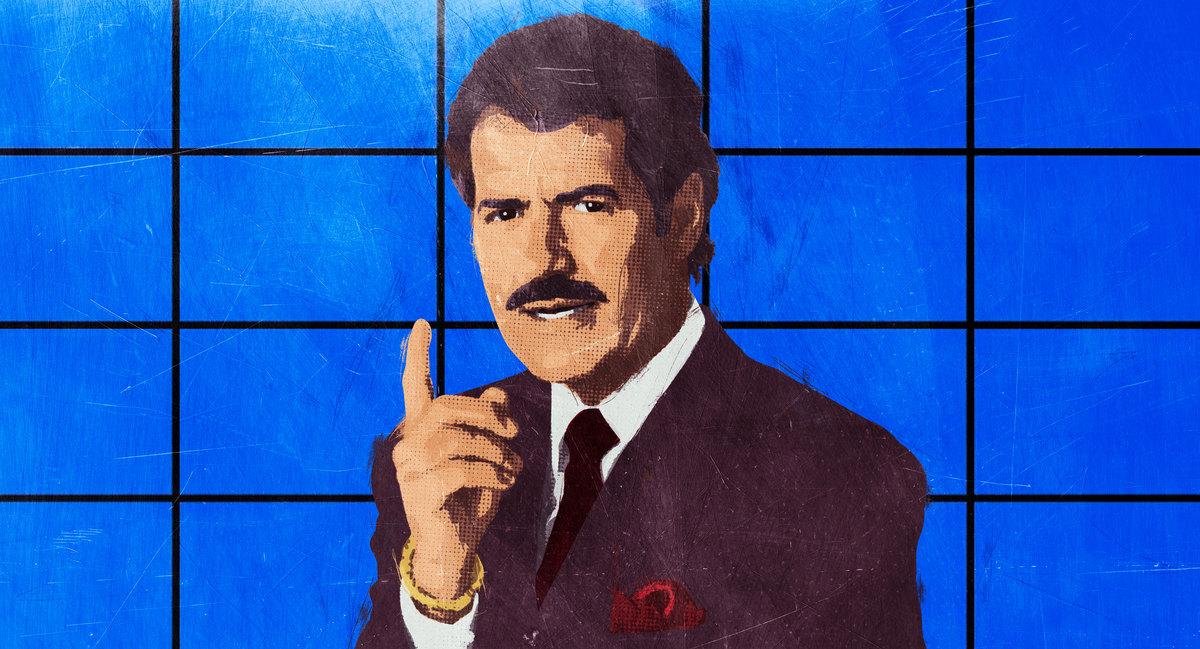Alex Trebek Forever Embodied the Joy of Curiosity
The longtime host ofu003cemu003e u003c/emu003e‘Jeopardy!’ died on Sunday at age 80. An excerpt from a new book sheds light on what made him such a beloved cultural figure—both on camera and off.On November 8, longtime Jeopardy! host Alex Trebek died due to complications of pancreatic cancer. He leaves behind a legacy as more than just a game show host. He was family.
The following is an excerpt from Answers in the Form of Questions: A Definitive History and Insider’s Guide to Jeopardy! It is based on interviews with Trebek from the last two years. The book, published November 10, is on sale now.
Though Alex Trebek might have come to Hollywood seeking show business generally, his pedagogy on Jeopardy! isn’t really a part. Fluent in English and French, he has said he can “fool around in” German, Italian, Spanish, and Russian (his father, George, immigrated to Canada from Ukraine). He mentions his daily crossword habit to me and says, with some satisfaction, that he can get through them all—“even the tough ones on Friday, Saturday.”
“What about the test for new contestants?” I ask. Did he really take it every year?
“I took it for, I don’t know, 15, 20 years,” Trebek says. “I said that when the day came that I failed the test, I would resign as host of the show. Then after that many years I said, ‘To hell with it. I’ve got the job.’”
That doesn’t mean, however, that he doesn’t consider knowing the answers (and, yes, questions) to be a point of pride. Contestant Ted Berg lost in a 2019 Final Jeopardy! when neither he nor his opponents—Gairen Wallace and then-18-time-champ Jason Zuffranieri, whose reign would finally come to an end in his next game—could come up with the name for the landmark that Mark Twain described “sputtering jets of fire” and “heat from Pele’s furnaces.”
As the credits rolled, the host—a devoted Twain fan— approached the three contestants, seemingly dismayed that none of them had worked it out. Berg says that he had known it was a Hawaiian volcano, but just couldn’t get to Kilauea. “Trebek came over to explain it to us afterward,” Berg remembers. “He was telling me, ‘Don’t you remember seeing those videos of the lava spilling out onto the road?’” For Berg, balm this was not.
As the years passed, Trebek seems to have had the realization that what started as the brisk officiousness of the game-show hosts of yore had started instead to strike audiences as a personality trait. If Trebek had begun his hosting career with the hope of projecting competence, control, and maybe just a hint of slick-talking charm, it read to some as the performance of a brusque smart aleck—sometimes fussy or outright mean.
So Trebek set about building it into a character.

In his many cameos on other shows, he mostly played Disappointed Trebek, or Judgmental Trebek, or Insufferable Know-It-All Trebek. He voiced himself on a 1997 episode of The Simpsons, sending studio goons—er, “judges”—after poor Marge to extract her negative winnings after a game didn’t go her way. More recently, he turned up as an overinvolved guest narrator during a live episode of the sitcom Hot in Cleveland, barging in to interrupt two characters struggling to remember the name of the Kathy Bates movie adaptation of a Stephen King novel. “Ooh, sorry, that’s wrong,” he begins. “The response we wanted was ‘What is Misery?’ Everybody knows that Fried Green Tomatoes is from the novel by Fannie Flagg—” He is shooed away at gunpoint. “He is such a know- it-all,” one of the show’s remainders sighs.
He appeared on The Weird Al Show in 1997, where he advertised “the Know-it-all Correspondence School.” “Would you like to make more money?” he asked. “Impress your friends? Be like me and know everything in the world? Sure you would!”
“He was not afraid to make fun of his persona,” Weird Al Yankovic himself remembers. “He totally got the humor and was totally game.”
I take my job very seriously. I don’t take myself too seriously.Alex Trebek
On Jeopardy!, watching for cracks in Trebek’s steely demeanor became something of a pastime for viewers, something like catching a comedian breaking. When Austin Rogers first appeared on the show in 2017 in a burst of exuberance most unlike the traditional contestant—whom one might imagine as the student most likely to remind the teacher to assign homework—Trebek seemed to make a show of his apparent annoyance. During Rogers’s first game, the bartender swore repeatedly after missing clues until Trebek finally chided him on air: “You realize, of course, that we will be bleeping two or three of what you’ve had to say so far this half hour.” In response, Rogers chuckled and carried on, defiantly telling Trebek, “That’s all right.” If they made a good pair, it was by the design of the host, who has developed a seasoned sports announcer’s sense of when to stay out of the way of the action and let momentum build, and when to jump in and egg his players on.
“I don’t mind poking fun at myself,” says Trebek—who once, during the finale of the Ultimate Tournament of Champions, opted to cut the tension by emerging onstage (and on camera) without his pants, his dark dress socks pulled up nearly to his knees. “I don’t even mind when other people poke fun at me.”
“What about Jeopardy!’s pop-culture and rap clues?” I ask. In recent years, the writers seem to have developed a fondness for loosing Trebek on hypermodern linguistics (a 2017 category—about female monarchs, of course: “Yas, Queen”) and especially unusual lyrics—for example, The Fresh Prince of Bel-Air’s theme song (“In the theme to this ’90s sitcom,” said the host before switching to a less-than-fluid staccato, “‘I pulled up to the house about 7 or 8 and I yelled to the cabbie, “Yo, homes, smell ya later!”’”). Isn’t it ever uncomfortable, I wondered, to find himself reading something like, as he did in one episode, “Panda, panda … panda panda panda panda panda”?
“No,” Trebek says.
Not at all?
Not at all. For Trebek (and, one supposes, for Jeopardy!, or at least for Jeopardy!’s social media arm), the strangeness is the goal. The usually studious host makes a point of not listening to the songs on clues like these ahead of taping—the better to sound perplexed. “I read the clues in a way that’s going to make me look silly and make the audiences laugh.
“I take my job very seriously,” he says. “I don’t take myself too seriously.”
In 2010, contestant Sally Ronald used her Q&A segment to tell a story about doing the chicken dance at a minor league baseball game. Ronald says that Trebek had never heard of the dance—a bobbing, clapping routine meant to evoke the bird, and thus somewhat less dignified than the waltz. “And he responded with a classic Alex ‘Oooookay’ and moved on to the next contestant,” she says.
But then, during a mid-game commercial break, he walked back to Ronald’s podium. “So what’s this dance again?” he asked.
Ronald explained, and then all of a sudden Trebek was doing it with her, both ducking and flapping their elbows like they didn’t have a care in the world.
Text © 2020 Claire McNear. Reprinted by permission of Twelve/Hachette Book Group.


